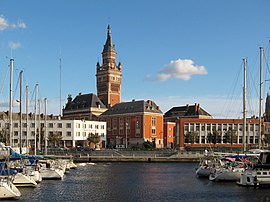Dunkirk, France
|
Dunkirk Dunkerque |
|||
|---|---|---|---|

Dunkirk Town Hall and port
|
|||
|
|||
| Coordinates: 51°02′18″N 2°22′39″E / 51.0383°N 2.377500°ECoordinates: 51°02′18″N 2°22′39″E / 51.0383°N 2.377500°E | |||
| Country | France | ||
| Region | Hauts-de-France | ||
| Department | Nord | ||
| Arrondissement | Dunkirk | ||
| Intercommunality | Dunkerque grand littoral | ||
| Government | |||
| • Mayor (2014-2020) | Patrice Vergriete | ||
| Area1 | 43.89 km2 (16.95 sq mi) | ||
| Population (2012)2 | 90,995 | ||
| • Density | 2,100/km2 (5,400/sq mi) | ||
| Time zone | CET (UTC+1) | ||
| • Summer (DST) | CEST (UTC+2) | ||
| INSEE/Postal code | 59183 / 59140, 59240, 59640 | ||
| Elevation | 0–17 m (0–56 ft) (avg. 4 m or 13 ft) |
||
|
1 French Land Register data, which excludes lakes, ponds, glaciers > 1 km² (0.386 sq mi or 247 acres) and river estuaries. 2Population without double counting: residents of multiple communes (e.g., students and military personnel) only counted once. |
|||
1 French Land Register data, which excludes lakes, ponds, glaciers > 1 km² (0.386 sq mi or 247 acres) and river estuaries.
Dunkirk (French: Dunkerque, pronounced: [dœ̃kɛʁk]; Dutch: Duinkerke(n), pronounced [ˈdœynkɛrkə(n)]; German: Dünkirchen; Polish: Dunkierka) is a commune in the Nord department in northern France. It lies 10 kilometres (6.2 mi) from the Belgian border. The population of the city (commune) at the 2012 census was 90,995 inhabitants.
The name of Dunkirk derives from West Flemish "dun(e)" (dune or dun) and "kerke" (church), which together means "church in the dunes". Until the middle of the 20th century the city was situated in the French Flemish area; today the local Flemish variety of the Dutch language can still be heard, but has largely been supplanted by French.
Nowadays, Dunkirk is the world's northernmost Francophone city (not counting minor Canadian settlements such as Fermont, which does have French as a majority language, but is not classified as a city).
...
Wikipedia




